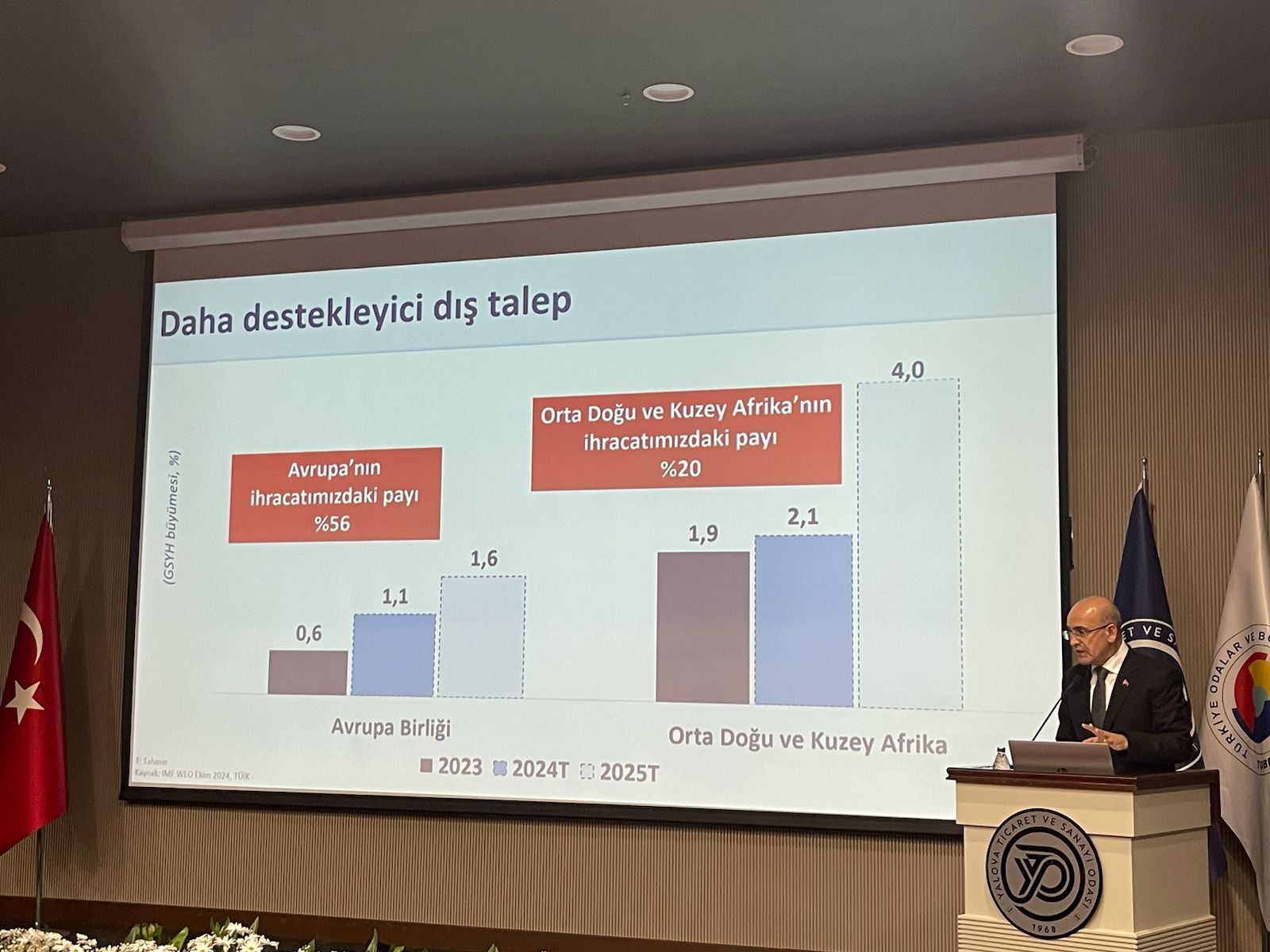At the traditional IICEC conference organized by Sabancı University at the Istanbul International Energy and Climate Center, Finance and Economy Minister Mehmet Şimşek spoke and made remarkable statements about the future of the Turkish and global economy in various fields.
In the presence of the MUSIAD Yalova Association and the management of Omran TRK represented by the Chairman of the Board of Directors and Member of the MUSIAD Association Abdulaziz Al-Kashif, Finance and Economy Minister Mehmet Şimşek made important statements about the future of global trade and Turkiye's economic situation. He pointed out that high global debt levels, an aging population, and the climate crisis pose threats to the global economy, but stressed that Turkey is in a privileged position and that reforms focusing on efficiency and innovation are needed to enter the "rich club".
Şimşek also added that determining fuel prices and some other goods based on inflation is one of the topics being considered on their agenda.
Fuel and Inflation
During his speech, Şimşek pointed out the possibility of making changes in the way fuel prices are determined. He explained that the government is studying the possibility of updating some inflation-related prices, such as fuel prices, according to the Domestic Producer Price Index (Yİ-ÜFE).
Global Growth Outlook
Şimşek pointed out that global economic growth expectations have reached their lowest levels in recent years, stressing that there are many structural obstacles that limit growth, such as rising trade barriers, high debt levels, aging populations and the climate crisis.
Global Trade and Economic Threats
He also touched on the trade competition between the United States and China, explaining that this competition has led to a move away from the multilateral system. He pointed out that the United States has imposed more than a thousand trade restrictions on China, while China has imposed more than 800 restrictions on the United States. He added that these developments are leading to a shift from free trade to trade protectionism, and that this shift is no longer limited to trade in goods but also includes services, investments and the financial sector.
Türkiye will be less affected
According to the IMF's forecasts, Şimşek warned that the decline in global trade could cause some major economies such as Germany and France to lose some of their economic power. However, he stressed that Türkiye would be less affected since the bulk of its foreign trade is with countries that have trade agreements or friendly countries, and therefore the impact of these developments on it would be less. He said: "About 75% of our exports are with friendly countries and countries that have free trade agreements. This shows that Türkiye will be less affected by these negative developments."

The situation in China should be taken into account
Şimşek also pointed to China's strength in the global manufacturing sector, especially in the automotive industry. He said that China has a large production capacity in the electric car industry, amounting to half of the world's production, which should be taken into account by policymakers and manufacturers.
Short- and long-term trends in trade
Şimşek also spoke about changes in global supply chains. In the short term, he expected that sourcing trends from nearby regions would increase, but in the long term, countries would tend to source from friendly countries.
Global Debt: Current Situation
Simşek pointed out that global debt levels are high, and that inflation will increase the burden of this debt. He stated that global debt has exceeded 300% of GDP. He also explained that Türkiye has advantages in this context, as its debt-to-GDP ratio is 95%, which is lower than its counterparts in developing countries.
Aging Population: An Economic Risk
Regarding the aging population, Simşek stressed that Türkiye still has an 18-year window to reduce this negative impact, with the possibility of extending this window to 30 years through reforms.
The Importance of Women's Participation in the Labor Market
Simşek pointed out that Turkiye's biggest economic opportunity lies in increasing women's participation in the labor market. He added: "If we reach a 60% female labor participation rate, we can achieve a 20% increase in GDP."
Artificial Intelligence: Opportunities and Challenges
Simşek stressed that artificial intelligence has great potential to improve productivity in Türkiye and the world, but warned of its risk of increasing income inequality. He explained that artificial intelligence can be a threat if Türkiye is not ready, but it will contribute to long-term prosperity if it is properly utilized.
Structural Reforms: A Necessity for Sustainable Success
Simşek stressed that sustainable decline in inflation and long-term financial success require comprehensive structural reforms. He stressed that these reforms will be essential for real long-term success.
Foreign Trade Relations
Simşek spoke about the important steps taken in foreign trade relations, such as updating the Customs Union with the European Union and strengthening free trade agreements with Gulf countries. He said that these developments will increase Türkiye's competitiveness.
Developments in the Railway Sector
Simşek noted that the government will attach great importance to investing in electric railway projects as part of its efforts to improve energy efficiency. He added that the focus will be on transforming Türkiye into a green industrial production center.
Reserves and Current Deficit
Simşek announced that Turkey's reserves have risen to $50 billion, noting that this strengthens the country's financial security. He also expected that Türkiye will witness a shift from a trade deficit to a trade surplus in the near future.
Successful Cash Flow Management
Simsik pointed out that cash flow management required a high level of skill, and praised the success of the Central Bank of Türkiye in this area. He also stressed that the financial and economic policies implemented will lead to a more sustainable financial structure in the future.